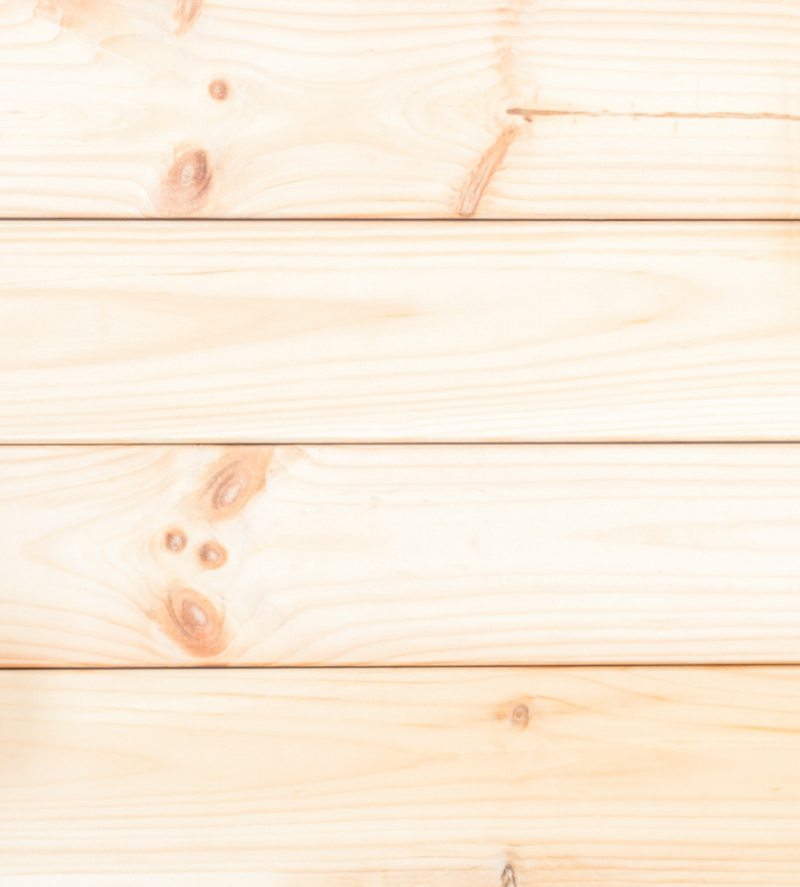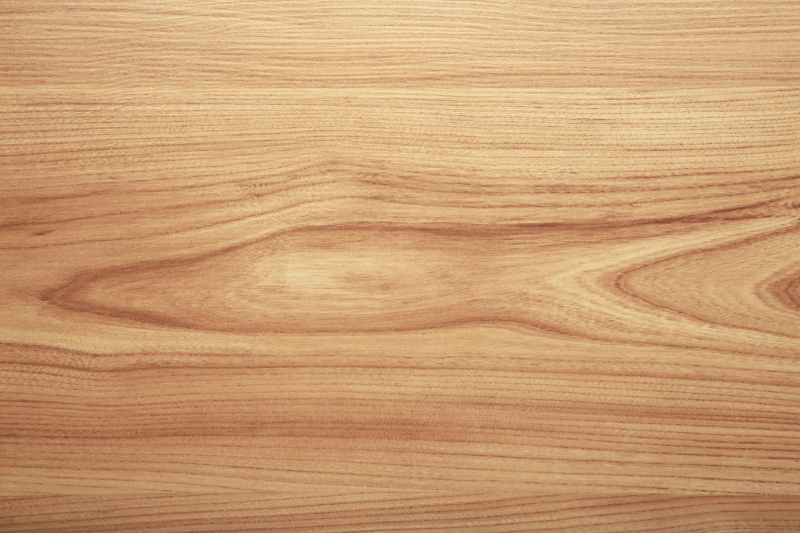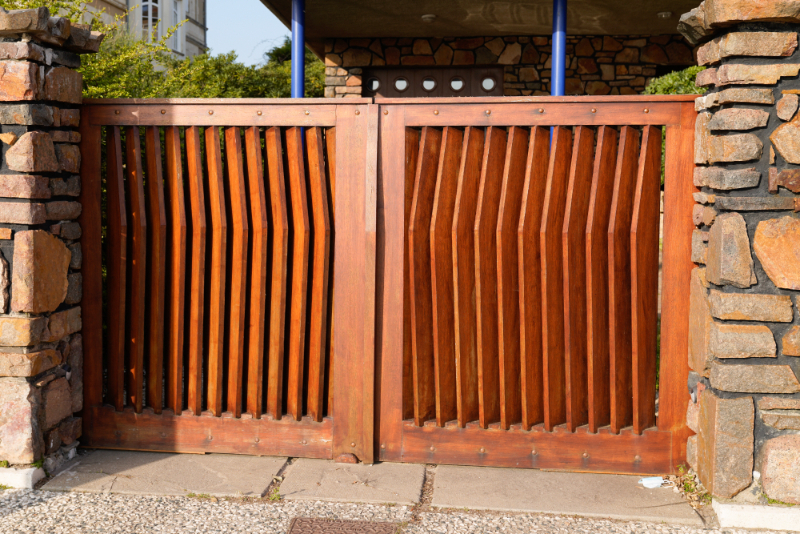Have you considered: what is the best timber suitable for driveway gates? In this article, we discuss the most common woods for gates and fences and outline their advantages. We look at what timber you should use for your new driveway gate?
What Timber should I choose for Gates?
Gates with ledges, morticed and tenon jointed gates, dowelled morticed and tenon jointed gates, through-wedged morticed and tenon jointed gates, standard and custom sizes... The list might go on forever. What kind of wood you choose for your gates is largely determined by what you want to do with them once they're done. Softwood gates are much less expensive than their hardwood counterparts. However, softwood is not as durable as hardwood in nearly all cases; there are exceptions to this rule, such as balsa, a hardwood used in model-making and other applications. Western red cedar, a softwood commonly found in cladding and with many characteristics of hardwood.
That is not to imply that a softwood alternative will be "here today and gone tomorrow"; if you properly care for your product, you should have many happy years of life from a softwood gate, but a hardwood gate, if properly cared for, will last far longer. Hardwoods are less 'knotty' than softwoods and hence more aesthetically appealing. In our experience, you can never fully make a softwood gate look like a hardwood gate by just staining it; the grain and knot content will always give it away, at least to a trained eye.
However, there is a new timber on the market that defies the adage of "hardwood outlasting softwood." It is known as Accoya. Accoya is a non-toxically modified radiata pine that has been non-toxically changed with acetic acid (essential vinegar). This provides the timber with tremendous durability, so much so that it is classed as class 1 durable (the highest class) and outperforms any other timber in its durability class. So, if you want the most durable wood for your gates, Accoya is the way to go. Just don't expect a softwood pricing for anything produced from Accoya, since it is an expensive timber that rivals European oak rates.
Contact Us
Don't be afraid to contact us and find out what we can do for you. It is within your rights to have your fence issues resolved to obtain the outcomes you have always desired. We can help you solve any unique wood conditions you require and make a suitable option for your fence and decking because of our understanding.
We can also provide and propose unique wood varieties that are easily placed, removed, and maintained. Our guide is here to help you leave your fencing looking spectacular, without any risk of the wood collapsing and your privacy paying the price. Our guide will teach you how to take the necessary steps and go above and beyond to make your home fantastic.
Please contact us if you have any questions or concerns about anything from height to cupping. We investigate all options when it comes to handling difficult wood standards; our years of knowledge are well worth your effort. Simply put, our team is proud to provide a beautiful finish to your fencing and decking.
Contact Us
There are lots of designs to choose from that are sure to leave you impressed. Ultimately, the most widely utilised softwoods in fencing in England are pine, larch, and spruce. Featherboard fence is the most traditionally utilised kind because it provides superior security against shrubs and weathering properties like snow. Pine, beech and maple are the most common types of wood to decay the fastest during autumn. Therefore, customers must apply materials that let the wood become less susceptible to decay and thrive better once spring comes around, especially if you're thinking of using glamping pods. This means that your wood is better protected and can continue to be long lasting.
If you're searching for a gate for your property, some of the best types of wood are oak and iroko for hardwood gates; this means that it provides better security. However, softwood is a cheaper option for those who don't have an excess of money to spend - if this is the case, redwood or red cedar is the best type of wood to choose. Untreated wood is less durable than pressure-treated wood since it has been chemically treated to prevent degradation and insect infestation. The wood is placed in a depressurised storage tank with a preservative to restore the air. Pressure-treated wood is more weather resistant than untreated lumber and hence keeps its integrity in circumstances where raw wood would rot.
Will your Gate Outlast the Weather?
Although moisture and temperature can cause wood to expand, swell and shrink, the influence of seasonal fluctuations is exacerbated by the UK's extremely variable weather. When surveyed in isolation, wood seems to contract at cold temperatures. Humidity also surges in areas like London throughout the colder seasons, which might cause your exposed wood to expand.
It's important to consider these qualities when choosing fencing wood; for the most part, wood such as birch, beech and alder shrink and expand the most. People continue to build and sell gates with flat rails that have no room for water to drain off, although our environment is wet whether we like it or not, and the only difference between summer and winter in the UK is that the rain is warmer. On the top edge of every horizontal rail, there must be a water run-off.
If you look outside at any of your window cills, you'll see a 9-degree angle; this is to allow any water that strikes the cill to drain out; otherwise, water would pool on any of the cills, causing fungal rot. If you want your gates to last, this is a requirement. A top rail or head from one of our Denbigh gates is displayed; the heads are double-angled to allow water to flow in both directions. Other rails in the gates would have a single angle, diverting water away from the boarded area of your gates.
Most Common Woods for Gates & Fences:

Spruce
Spruce
Spruce is a popular choice for matching gates since it is frequently used for pre-made fences. It's a low-cost alternative (it's generally the cheapest gate and fence timber), and many people like it for that reason. However, you get what you pay for, and spruce warps with time. If you reside in a wet, snowy, or coastal region, avoid spruce.
It also attracts insects, so either use pre-treated wood or treat it right away. However, spruce has certain advantages as well. Due to its light hue, it's ideal for painting and staining. If you want a vibrant gate and are ready to put in a little additional work with treatment and preservatives, spruce is a great choice.
Fir
This is a long-lasting and cost-effective wood. Fir and pine are frequently pre-treated with a stain and may include an insecticide. These timbers are treated with something like alkaline copper quat (ACQ), which prevents pests from infiltrating. It keeps termites away, which is great if you live in a termite area.
Although older gardeners may suggest chromate copper arsenate, CCA, as a cure for wooden gates, is typically avoided with arsenic-based compounds these days. Douglas fir is a hardy softwood that's suitable for a variety of landscaping applications. It has a lovely yellow colour that fades with time. If you want to preserve your fir gate appearing natural, apply a clear stain on it to seal in the gorgeous golden hue.

Fir

Pine
Pine
Pine is a popular wood for garden gates since it is both inexpensive and durable. It, like fir, is frequently pre-treated with preservatives and insects, but you should confirm this with your provider. A common option is a southern yellow pine. Some providers may kiln-dry and pressure-treat it to eliminate a significant amount of moisture, which aids in the prevention of deterioration.
It's a wonderful choice for simple painting or staining, so if you have a colour scheme in mind, this might be the wood for you. However, pine is inexpensive for a reason, and it must be cared for properly to avoid warping and deterioration. Again, it's not the ideal wood for wetter regions. If you're willing to maintain it, it's still a terrific option for most yards.
Cypress
Cypress contains a chemical called cypretine, therefore it does not require pesticide treatment. This is a natural insect repellent that has made cypress a popular fencing material for generations. Cypress is rot-resistant; therefore, it will last a long time without needing to be treated. It features a tight grain that reduces warping and is simple to work with. It does, however, fade to grey with time.
If you want to retain your hair's natural colour and prevent it from greying, you'll need to colour it. It also accepts paint well if you want to change the colour. This isn't always the cheapest option – or, more specifically, it isn't the cheapest option if you reside in certain portions of the United States. It's native to the southern United States, so if you reside farther north, you'll have to spend more for cypress to cover transportation expenses.

Cypress

Cedar
Cedar
For decades, Western red cedar has been considered the best economical wood to be used, it's strong and safe for all members of the family. We all enjoy the fresh, clean aroma of cedar.
This wood is endowed with a wealth of natural oils that, in addition to emitting a piney aroma, naturally repel insects. It's rot-resistant, like cypress, but you might want to keep treating it to keep its original colour. Some individuals prefer the silvery-grey colour, which looks fantastic in modern settings.
Red cedar is an excellent wood to work with since it is both lightweight and sturdy. If you reside in the Midwest, you should have little trouble finding red cedar. The characteristics of various cedar species vary. Western and
Eastern red cedars are exceedingly hardy, but Northern white cedars are not. You'll need to look up the definition of "cedar." Cedarwood is often in the centre of the price spectrum. It is a less expensive option than other woods since it does not require as much maintenance.
One of the most serious flaws is that it does not take paint well. Use pine or spruce for a painted garden gate, or spend a little more money and get redwood. Red cedar has always been utilised in boat construction due to its low weight and robustness, two characteristics that make it one of the greatest types of wood for gate manufacturing. Due to red cedar being inherently rot-resistant, it does not require a preservative coating to protect it. Uncoated red cedar, on the other hand, weathers to a nice silver colour. Types of wood such as beech, mahogany, ash, oak, teak, and walnut are all from hardwood trees.
Mahogany is a tougher wood with lovely grain patterns; both western red cedar and mahogany gates are well-known for their durability. Cedar is inherently more resistant to insects and deterioration than many other kinds of wood; mahogany is much more resistant to rot. Cedar is often recognised as the gold standard in terms of rot and insect resistance in the wood trim. Cedar is a softwood that outperforms the majority of pressure-treated woods. The clear lacquer is widely used to stain cedar used for fences and decks.The extractives react with the metal in nails or screws used for installation. Cedar is the best wood to use to repel insect attacks and one with great durability.
Redwood
Redwood is a popular choice for gates and fences because it is both attractive and long-lasting. Redwood's rich scarlet tone makes it an excellent choice for gorgeous natural wood.
You may need to treat it again to maintain the original colour, which you may do using a clear stain that won't change the colour. Although preservatives and insecticides are commonly used on oak gates, the tannin component naturally repels insects. It is also water-resistant.
Redwood will outperform most other woods in the region if you live in a rainy or snowy climate. It's also ideal for coastal environments.
Redwood is a fantastic choice if you have the budget since it is robust yet simple to work with, porous enough to absorb stains well, and, of course, it has that naturally lovely reddish-brown hue. If you choose to paint it, it will glide on smoothly as long as you apply the right primer beforehand. Redwood is an excellent choice for a low-cost wooden gate.

Redwood
It is a reasonably durable hardwood with red-brown heartwood that may be used to match or enhance the majority of an existing garden or perimeter fences. It is popular, but it requires more treatment than other woods to retain its strength and look. Due to its high natural oil content, red cedar is a one-of-a-kind substance. It is valued for its capacity to repel insects and fungus that might otherwise destroy other woods, as well as its stability, which means it is less prone to distort or shrink. Weather, sun, and moisture cause boards to bend and twist; it's inescapable.
Wood expands as it absorbs water and contracts as it dries. Some boards are less likely to be considerably impacted by the changes, while others are significantly influenced. Two factors influence the degree of change: grain pattern and species. For two reasons, redwood is the master of being able to prevent warping and shrinking. It has the most straight grain pattern and an internal chemical that is similar to tannin and protects the wood from moisture penetration and degradation. When it comes to decks, patio furniture, structural bracing, and even trim, redwood is by far the most stable of all industrial woods.
Softwood or Hardwood?
In nature, softwood and hardwood are characterised by their reproduction rather than their final form and characteristics. The advantages of these two types of wood vary, ranging from the material's strength to its appearance and longevity. Softwood is a popular choice for both residential and commercial gates since it is extensively used in a range of sectors and is normally extremely durable. Redwood is the most commonly used softwood since it is the least costly option; but, for a little extra money, the excellent durability of Siberian larch or Western red cedar may prove important against knocks, bumps, and even insect damage.
Oak, teak, sapele, iroko, and meranti are the most prevalent hardwoods. These variables increase raise the cost of the wood since they develop at a considerably slower rate and require longer drying durations. Hardwoods are substantially more durable than softwoods and are frequently used for tasks that need utmost durability. Hardwoods like beech, maple, and walnut are typically used for bespoke joinery tasks, such as making furniture, hardwood floors, and beautiful veneers. These hardwoods are best suited for these jobs because they value specific aesthetic traits such as colour and woodgrain.
Softwoods are derived from evergreen (coniferous trees), which produce needles and cones all year and are known as gymnosperms. Softwood accounts for over 80% of all timber and is often supplied in long, rectangular shapes such as planks, posts, and rails.
Softwood is widely utilised by companies in construction, including roof and inner wall constructions, as well as fixtures and fittings, doors, and other building components. It's also the principal ingredient in several man-made boards, such as medium density fiberboard.
Hardwood is prone to be used in the majority of furniture such as tables, chairs, and chest drawers. It can also be utilised in things like window frames. Softwood is well-known for its adaptability and strength.
Softwood, which is sourced from all over the world, has a wide range of uses and a wonderful aesthetic appeal and may be used in a variety of indoor and exterior projects, ranging from furniture and flooring to decking, landscaping, external joinery, and structural applications
Softwoods are more widely accessible and easier to work with. They also evolve at a faster rate, resulting in cheaper costs. They are more pliable, lighter, and less dense than other hardwoods. Softwoods are often used in interior mouldings, window fabrication, building framing, and the production of sheet products like plywood and fiberboard.
The advantages of hardwood derive from the tightness of the grain, which provides excellent resistance against UV radiation and moisture. In terms of appearance, hardwood may be painted or stained to fit the style of your home.
Iroko and European oak are the two most common hardwoods used for gates. Iroko is a long-lasting, stable, and appealing wood with a long lifespan, but European oak is a denser wood with a high tannin content that makes it resistant to fungal and insect assaults.
Hardwood originates from deciduous trees that shed their leaves every year. Conifers produce softwood, which is generally evergreen. Hardwood comes from slower-growing trees, which means the wood is generally denser.
Hardwood is regarded as the most versatile material, with uses ranging from fine veneers and furniture to musical instruments, flooring, construction, and boatbuilding.
It is a truly beautiful material, available in an infinite number of species, specs, and colours. Hardwoods have a higher level of strength and durability due to their compact and more complicated structure.
Are you looking for wooden driveway gates near you? If you require garden gates in Milton Keynes, Buckinghamshire contact us today. Our garden design experts can supply and install beautiful wooden garden gates for you and your family to enjoy for years to come.


